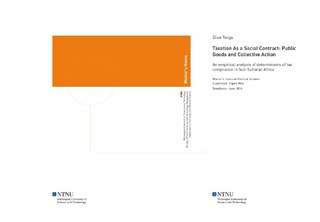| dc.description.abstract | Increasing tax revenue is an important aspect of development policy as it is associated with sustainable economic development. In order to increase tax compliance, it is vital to understand its determinants. According to the fiscal contract theory, people assent to pay taxes because they value what they gain from it - public services. Tax paying is a horizontal relationship between the citizens and the state. However, focusing especially on income taxation, the vertical relationship between the citizens receives more and more attention. Because paying taxes implies giving up a part of your personal income for the benefit of your co-citizens, taxation becomes a classical collective action dilemma. Thus, the relationship between the citizens becomes an important determinant for tax compliance. The main argument put forward in this thesis is that a society that aims to increase tax compliance should be a socially cohesive society, which includes providing public services, but also values such as social capital, a common national identity and social solidarity. This is of immediate relevance to Sub-Saharan Africa, where there are huge variation in both public service provision and social cohesion, and where it is vital to understand the determinants of tax compliance in order to increase the tax to GDPratio in the region. Using data from the Afrobarometer survey Round 5 (2011-2013), this thesis performs a binary logistic cross-country analysis across 28 countries in Sub-Saharan Africa. The main finding in this thesis is that the traditional approach to the fiscal contract is what matters the most. Additionally, political legitimacy is an important determinant of tax compliance. However, social cohesion does provide some explanatory power in the sense that social solidarity also increases tax compliance. There is also reason to believe that there are huge differences between the countries, which paves the way for additional research on this topic. | nb_NO |
